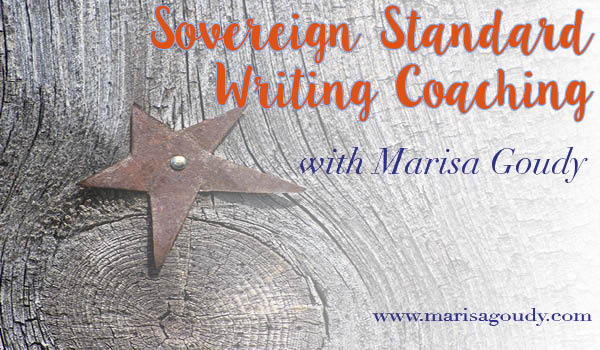
BLOG
A story from the cave beneath the mountain of marketing and spin
Sovereign Standard, Issue 39 Right now, every fiber of my being (except for the fibers that are occupied with holding a toddler on my hip as I help my first-grader make turkeys out of candy corns and Oreos) is occupied with story.
Right now, every fiber of my being (except for the fibers that are occupied with holding a toddler on my hip as I help my first-grader make turkeys out of candy corns and Oreos) is occupied with story.
What does it take to translate the thoughts and emotions and in-process “stuff” into a story that engages, reveals collective insights, and exposes truths?
I don’t have the whole answer yet, but I’m getting closer.
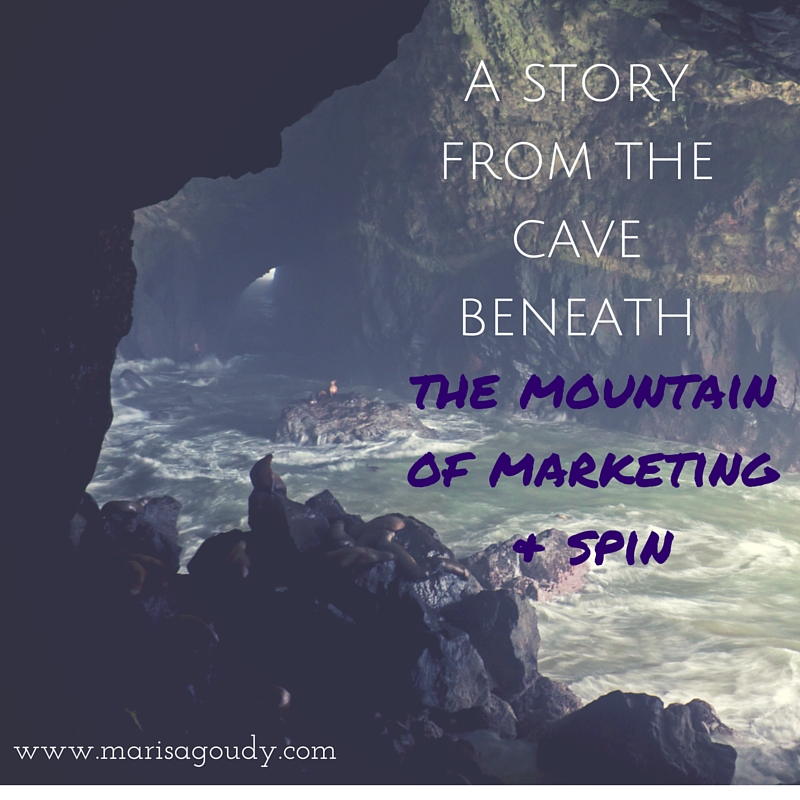 The best writing begins in private
The best writing begins in private
To allow myself the true freedom to wonder and wander, I’m dialing back my public writing. I've been pulling deep inside to where the really stories live. It's the place deep below the marketing and the spin - in the caves where the truth rubs elbows with fear and dreams struggle against despair.
[tweetthis]Story is born in caves where the truth rubs elbows with fear & dreams struggle against despair.[/tweetthis]
In a world where storytelling is celebrated as an art and foisted upon us as a marketing tactic, it’s easy to get burned out on story - particularly when you feel like you weren’t blessed with the Scheherazade gene.
I do believe that “everybody has a story” because it was reality long before it was a cliche (or the theme of a zillion ad campaigns). But there’s a lot more to unlocking natural storytelling abilities than shoving a mic or a blog password into someone's hand and commanding “have the courage to tell your story.”
The alchemy of turning "your stuff" into "Your Sovereign Story"
As 2015 dims to allow the new year to shine bright, I’ll have a great deal to say - and to offer - about this alchemical process of turning “your stuff” into “Your Sovereign Story.”
In the meantime, please give yourself permission to slow down and watch out for the unforgettable characters and plot twists (especially those who show up around your Thanksgiving table).
Begin to consciously collect the experiences that will give your stories life... I'll be back soon to help you figure out what to do with the material!
How to say the right thing when every word matters
MG_Header_w_biline_hires
Sovereign Standard, Issue 38Words are like playthings.
The amuse. They teach. They inspire. They’re the building blocks of story.
But words can also be discarded toys, spread all over the floor. Just more clutter. Meaningless and forgotten.
When mindful people (and professionals) use words mindlessly
How to say the right thing when every word matters. On writing and speaking your truth by Marisa Goudy.
Writers, healers, and clinicians whose work relies on talking it all through... Words are at the heart of what we offer. Even though language has its limits, we count on words to mean something.
And yet, I know I’m guilty of using words mindlessly.
Lapsing into profanity when I’m tired or “in a mood. ” Barking conflicting commands as I try to rally my first-grader to the bus stop. Just throwing together a bio for a social media profile without thinking about whether I am sharing the most important parts of my story.
Everyone has heard “do as I say, not as I do.” For many of us, “do as I do, not as I say” is often just as applicable.
In part, this refusal to "mind the mouth" is a stand against political correctness. It’s rebellion in the face of mindfulness.
Some of this mindless use of words is to be blamed on the influence of the culture - particularly when violence creeps into our metaphors.
And, frankly, sometimes it’s just exhaustion. It’s hard to keep track of every word when you're in a state of constant communication.
If some words matter, all words matter
I am compassionately declaring an end to my hypocrisy:
If some words have power, then all words have power. And I'm going to try my best to use my power wisely.
[tweetthis]If some words have power, all words have power. I'm trying to use my #writing powers wisely[/tweetthis]
The hurtful words and the healing words. All the language that falls in between that great spectrum of thought. Every word is important in the spells you cast, in the messages you’re sending out into the world.
“It’s just a throwaway comment” isn’t an excuse you can fall back on when you assert that words have power and resonance.
(Believe me, I am not completely happy about this pronouncement. The last thing I need are more rules or complications. But stick with me - there are lights every few feet along this tunnel into the underbelly of how we communicate!)
The resistance: nobody likes the word police
Engineers hate being married to English majors.
Oops… I just threw out “hate” and made a sweeping generalization there. I know it’s not really true. And I am almost sure that you know that I know it’s not true, but I wanted to get your attention and it felt like a fun, clever way to introduce this next point.
You see, paying close attention to your words doesn’t mean that you have to become a milquetoast writer… You just have to know when you’re throwing a bomb spiked with letters and punctuation.
When my husband and I are debating (ok, I should probably say “arguing”), I sometimes ask if he really means what he just said, because "I do no think that word means what you think it means." I tell myself I am seeking clarity and connection, not being a vocabulary zealot. And I am hoping he thinks “cute Princess Bride quote.”
Unfortunately, he doesn't like it when he feels the dictionary policewoman is calling him to task on imprecise language. “Sorry, we can’t all have master’s degrees in English!” he’ll remark.
To be fair, sometimes distracted English majors get irritated with their techy mates.
I often ask Husband to pass me “the thingie that we use to fix the baby’s toy with the stupid broken bit.” He smirks, asks whether I want the phillips head screwdriver to repair the cracked battery door, and takes care of it himself. “Sorry, we can’t all build robots for a living,” I sigh.
As a writer and thought leader-in-training you owe it to yourself to analyze your word choices
Though potentially quite illuminating, analyzing word choice in the midst of conversation feels pretty tedious. Fortunately, reviewing the way you choose and use words in your own writing is much less stressful - and quite unlikely to result in either spouse sleeping on the couch.
Thanks to the direction of my brilliant sales coach, Tami Smith, I am examining the “threads” that have shown up repeatedly in my work over the last year. It’s a quest to uncover my recurring words, concepts, and images.
This is my opportunity to pause and look at the common elements in my own stories. It’s helping me understand how I’ve been defining and living my signature concepts, Sovereignty and the Sovereign Story - often without even knowing it.
In this case, the unconscious use of language is helpful and revelatory.
Shut up, listen to yourself, and do some research
There are certain words you use again and again. Over time, you inhabit their meaning. You then expand and redefine what these words mean to better express your unique vision.
This expansion and redefinition process can be organic and even accidental as you write into a term, use it in your daily life, and shape it with your experiences.
But then, there’s even more to learn when you close your mouth, put down the pen, and start listening to yourself.
When you pause to dig into a beloved word’s history and connotations, these fresh ideas push the boundaries of your work even further. And reaching your edge beautiful thing.
Some insight into one of the mindful professional’s favorite words
One word I use constantly is “insight.”
I am drawn to insight because it folds information, knowledge, and wisdom together into a nice, two syllable package. I want to be seen as someone who is insightful and I want to be someone who opens readers and clients to their own insights.
The former academic in me cringes when I cite Wikipedia rather than go to primary source materials, but I’m giving myself permission, just this once. That’s what Wikipedia is for after all - it guides you in the initial “I wonder…” stage and then open doors to further inquiry.
Adapted from the entry on insight, the word can generally be defined as:
The capacity to gain an accurate and deep intuitive understanding of a person or thing.
Suddenly seeing a problem in a new way, connecting the problem to another relevant problem/solution pair, releasing past experiences that are blocking the solution, or seeing problem in a larger, coherent context.
In psychology, insight
occurs when a solution to a problem presents itself quickly and without warning
can mean the ability to recognize one's own mental illness
In marketing, insight
is a statement based on a deep understanding of your target consumers' attitudes and beliefs, which connects at an emotional level and provokes a clear response
Suddenly, what I thought was a nice, broad term related to imparting truths and gaining understanding reveals itself to be an important term in the field of psychology. Now, I will use it more mindfully in copy that’s directed at the clinicians in my audience. I’ll also be able to use it more skillfully in writing coaching consults and copywriting jobs for therapists.
And it’s meaningful to note that “insight” is also a marketing term. I instinctively knew that we all need insight into our ideal clients and readers, but I had no idea it was a “real” buzzword (at least according to the anonymous strangers who created this Wikipedia article).
Owning the power of words is a brave, necessary, challenging act
Once you admit to yourself that every word does have a measure of power, you can’t teach your child that old “sticks and stones” rhyme in good conscience. You can’t write off sexist or homophobic remarks as mere teasing. Never again can you ignore any threats that someone makes to herself or others.
Sounds… earnest.
If you’re a semi-irreverent soul like me, someone who doesn’t much like formalities and who thinks creativity is about coloring outside the lines, it sounds like a rather uptight way to move through life.
That’s just my fear of change speaking. I'm afraid of holding myself to a kinder, more conscious standard because I'm afraid I'll fail.
In truth, playing it fast and loose and talking or writing yourself into corners (“I know I said that, but, actually, I meant…”) is actually a much more restrictive way to live.
Yes, as you become what Don Miguel Ruiz calls “impeccable with your word,” you’ll irritate some people. You'll fall into old "whatever" speech patterns. You'll go for easy but dangerous metaphors rather than articulating your healing truth.
Trust yourself. Forgive yourself. Speak for your best self. Stand sovereign in your dedication to telling a story that you’re proud to claim as your own. Writing coaching by Marisa Goudy.
Trust yourself. Forgive yourself. Speak for your best self.
Stand sovereign in your dedication to telling a story that you’re proud to claim as your own.
Can you commit to mindfully choosing your words? Let me know you're with me in the comments and please share this post with your community.
The end of the "call to action" for healers and private practice therapists
Sovereign Standard, Issue 32 What is your goal when you sit in a room with a client?
What is your goal when you sit in a room with a client?
To guide, to partner, to support. Perhaps to educate and inspire.
What about “convince” or “persuade”? Um, ick.
The role of the healer
As an energy healer with my own small practice, I cringe at the thought of “convincing” a vulnerable client of anything while she lies on my table. Though I am not bound by the codified ethics of a mental health or other licensed medical practitioner, I am bound by my own personal ethics and by the basic “job description” that my teacher and mentor Eleanora Amendolara gave me:
To be a healer is to facilitate another’s awakening.
To facilitate and hold space for another person’s unfolding is a privilege and an honor I don’t take lightly - and as a clinician or holistic professional, I know you also feel the precious weight of such a responsibility too.
In session, deep work takes place. Huge blocks get cleared. A great deal of pain and resistance might emerge in the process. As a healer, you are the witness and the source of safety.
You don’t force or convince anyone of anything that isn’t theirs. The healing wisdom each individual needs is already within. You’re there to help unlock those hard-to-find internal doors and windows.
The healer’s experience as a marketer
How do you get those beautiful people in need into your office so you can perform your magic and offer up your healing medicine?
You market yourself.
At least that’s the mainstream way to talk about it.
You use ads and in-person networking and social media and you create a website that converts. You develop just the right copy and just the right elevator speech that speaks to the pain points and shows that you’ve got just the solution.
Some of this marketing stuff feels fine, some a little suspect, and some advice simply doesn't apply to you. You do what you have to do to spread your message and introduce your work to your perfectly imperfect people.
Walking in both worlds: the private practice and the public marketplace
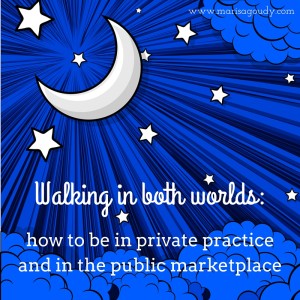 As you know, I am steeped in this marketing process.
As you know, I am steeped in this marketing process.
I moonlight as an energy healer - quite literally, in the sense that my healing abilities get charged up thanks to a sighting of the moon. She reminds me that there’s a great big universe out there that puts all our human stories in perspective.
But my “real” job is as a writing coach who helps you produce meaningful content so you can be an effective player in the online marketing game.
I walk in both worlds. And, as a healing professional who is building a business, you do too.
We perceive the dissonance between the persuade, convert, sell approach and the gentle, connected process of actually helping people.
But we agree that "marketing" isn't a dirty word, right?
“Marketing is a bad word” is so 2010.
Saying “I don’t do marketing” with a vaguely superior shudder just doesn’t cut it anymore. You probably don’t even know many practitioners like that since you’ve set out to connect with colleagues who share your growth mindset!
[tweetthis]The "I don't do marketing" attitude is so 2010. I'm a healer with a growth mindset.[/tweetthis]
So, yes, we have accepted - and embraced! - the dynamic, creative process that is content marketing. We use blog posts, articles, and social platforms to tell stories that draw readers and clients.
But, still, there’s dissonance between the mainstream messages about how to lure clients and the experience you create for the clients you have.
If “persuade them to take action” is the foundation of marketing, do you have to be one person in your treatment space and someone else when you're trying to attract clients online?
In a word: no.
You can walk in both worlds, stay true to yourself, and build business.
[tweetthis]Yes, you can walk in both worlds and thrive as a healer and a businessperson.[/tweetthis]
The secret to authentic, integrated marketing for therapists and healers
As you’d expect from a writer, I’ll tell you the secret to authenticity is in the words you choose.
As you’d expect from a healer, I’ll tell you the secret to integrity is in the energy you put into your communication.
Simply shift “persuade” or “convince” into invite.
The end of the call to action
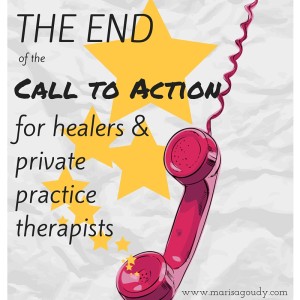 For years, I’ve happily offered up one of the most elementary acronyms in the copywriter’s arsenal: CTA.
For years, I’ve happily offered up one of the most elementary acronyms in the copywriter’s arsenal: CTA.
A “call to action” is what every web page and every piece of sales collateral needs to include. (Or so “they” always say…)
It’s time to adjust the wording to reflect an energetic shift in how we look at transforming curious web surfers and readers into committed clients.
Let’s call it the Invitation to Action.
It’s a minor shift, especially since there is nothing particularly objectionable in the word “call” itself. But, as clinicians and holistic service providers who hold rather than force, isn’t it time to step away from phrases that are synonymous with “tell ‘em what to do”?
How can the "Invitation to Action" change everything about your approach to marketing?
“Invitation to action” is not an invitation to forget everything you have learned about marketing.
It doesn't allow you to escape the risky business of self promotion and it doesn't permit you to pull back into yourself.
It’s not an excuse to write “nice,” vague copy that hints at “maybe you want to call me someday.”
Instead, "Invitation to action" is an energetic pivot that takes you out of pushing and into holding.
The "ITA" is still effective. It's all the more effective because it's in alignment with who you really are.
Begin to get comfortable with this phrase by using it as the headline on an invitation you’re writing for yourself.
You are invited to compose your next sales page, blog post, or social media update as a fully integrated marketer-writer-healer.
Use your website to create a safe, welcoming space. Use your words to offer ideas and options and well-intentioned suggestions. Use your expertise - and trust your expertise - to show prospective clients that you’ve got the medicine they need.
Learn a new way to invite clients into your practice - discover the Story Triangle. Sign up for the next free class coming up on May 11!
How do private practice therapists take the creative risk and keep a blog?
"Creativity is the ability to take a risk. To actually put yourself on the line and risk ridicule, being pilloried, criticized, whatever. But... you must take that risk."
Sting - and specifically his Ted talk about how he reconnected with his creativity - inspired me to think about the risks we take as writers, as thinkers, as content creators, and as publishers.
Does creativity feel like a risk to you?
How do private practice therapists take the creative risk of keeping a blog?
Creating and sharing haven’t always felt risky for me.
Think of yourself as a kid. Think of what Picasso said: "Every child is an artist. The problem is how to remain an artist once we grow up."
Art was life, not risk.
As I grow older, as my circles of influence grow a little wider, and as more people are likely to read my words, I finally feel the tingle of “this is risky” when I hit publish.
Blogging for business can be your best creative outlet
As full as life is - and I know you can relate to this - creative time can be scarce. You're in two nonstop races when you run a family and you run a business - or at least it can feel that way.
In my case, if there's any “me” time at all, it’s a choice between meditate, exercise, or do some creative writing.
Since I tend to choose whatever offers maximum overall benefit and can be done during nap time, I choose meditation. That means I’m in pretty lousy shape and it means my beloved fiction projects are languishing.
It also means my untapped creative writing juices get poured into my blogging and content marketing. Because I need to build a business to support this family, that’s the perfect mix right now.
If writing for the business is the creative outlet, then blogging can feel risky too
[tweetthis]If creativity=risk and biz blogging is a #creative practice, does that make #writing risky?[/tweetthis]
Thinking aloud, trying out a theory in a public space, taking on issues that people would rather not examine, publishing it online for all the world to see… all of this can feel dangerous.
Even though we’re all getting used to living out loud when we're on online, it can start to feel dicey when you consider your professional persona.
This is especially true if you feel particuarly cautious about sharing personal stories - either because you’re a naturally private person or because you’re a therapist in private practice.
When you start to build an audience and you sincerely hope those people will invest in what you do, “just write and hit publish” starts to feel kinda scary.
And there’s a particular kind of risk inherent to publishing a blog post for your business:
You can’t always be sure that you’re writing about an idea that speaks to the concerns of your ideal readers and clients. What if the story you need to tell right now springs from your own psyche and your own needs?
Discern your own stories from the Greater Story your business & your readers need you to tell
[tweetthis]Some stories are private. Some need to get tweeted like crazy. Can you tell the difference?[/tweetthis]
Experience. Listening. Mindfulness.
And trust.
Trust that you’ve created a reciprocal relationship with you readers that allows you to hear their needs above your own internal noise.
Trust that your readers are willing to journey with you into the uncharted territory of your inner world. (Within reason… this is a professional, not a confessional blog!)
There’s no simple formula. Again, it’s a creative act - because yes, blogging for your business can be a deeply creative process. There are risks and you may not always get it right, but that whole “nothing ventured, nothing gained” idea certainly applies in this case.
[tweetthis]Shh! I'm writing. #Blogging for my business is my creative outlet.[/tweetthis]
Is writing the “right” story easier or harder for therapists?
So, having decided to write about other people instead of myself, a further irony is that sometimes you reveal more about yourself than you'd ever intended. - Sting at TED Vancouver in 2014
Is writing the "right" story harder for therapists?
Storytelling is an intensely personal act.
That is why it is such an effective way to reach and engage people. You do risk revealing yourself when you tell a story - even if you never use a personal pronoun.
The way a narrator takes a chance and puts herself on the line? That is exactly what gets people to pay attention.
You might think that discerning whether a story is acceptably universal or too rooted in personal concerns would be easier for therapists. After all, your work is about witnessing and holding space for others’ emotions.
You know what occupies many hearts and minds. And you've generally been taught to keep yourSELF out the equation.
For example, when someone reveals a concern about infidelity or chronic anxiety or the stress of parenting, you know it’s a topic that you could explore on your blog (ethically and without identifying details, of course). When you see patterns emerge in your practice, you've discover a collective problem that will interest many of your readers.
But what if you’re drawn to discuss a topic because it’s rippling through your own life or because it colors your past?
Then, telling the story - even without an "I" - can feel risky. You're not so sure you're telling the "right" story and distinguishing between the personal and universal.
Through the writing process - which reveals countless hidden truths - you may realize that it's hard to publish a post and maintain your professional posture when you’re bent under the strain of your own experiences.
So what do you do?
When your own "stuff" wants to come into your blog and you're not totally sure what is yours, what is important for the community, and what is just plain old whiny nonsense, in addition to practicing mindfulness and trust, practice gentleness.
Be gentle with your story, with your need to tell it, with your audience. After all, they put themselves in your care when they gather round to hear what you have to say.
And get a second set of eyes to review the post before you hit publish.
Often, a non-therapist with distance from your situation will be the best reader because they offer the gift of impartiality. They can tell you what resonates in the heart of the common reader, what feels like psychobabble buzz, and what feels too autobiographical.
I happen to be a non-therapist who loves to play the role of your ideal reader. As your writing coach, I can help you figure out which stories to tell and support you as your find just the right words to tell them.
A Writing-for-Business Practice is a Writer’s Practice
Sovereign Standard, Issue 28 An editorial calendar is nothing; a writer’s practice is everything.
An editorial calendar is nothing; a writer’s practice is everything.
I kind of stole that from Ike.
 “Plans are nothing; planning is everything.”
“Plans are nothing; planning is everything.”
President Eisenhower was likely talking about the planning process required for taking a beachhead or running a country, but his statement encouraged me to think about blogging and writing for your business in a new way.
[tweetthis]Making a plan for your #blog is nothing. The #writing process is everything.[/tweetthis]
Making a plan for your blog is useless. The writing process is everything... When the coaching industry exists to sell you strategies and organization tips, this sounds like heresy, but editorial calendars are meaningless to me - and I bet they’re pretty useless to you too.
Forget editorial calendars. Writing is sustained by practice (and, well, writing).
I write and support writers for a living, but I have never had an editorial calendar.
[tweetthis]An editorial calendar is nothing; a writer’s practice is everything.[/tweetthis]
I’ve started plenty of spreadsheets called “editorial calendar.” I’ve listed publication target dates on the left side and created columns with important headers like “title,” “category,” and “call to action.”
And then… I’ve never gotten past the first entry. Six months later, inspired by advice I’ve given to my own clients, I try all over again (sometimes I even remember to just copy and past the old, useless calendar).
Invariably, however, I fall back into my old “no-plan plan.” And the writing still gets done.
Why do I do it this way? Because it works.
Does it work because I’m a born writer who thrives on chaos rather than organization?
Nope.
It works because I’m dedicated to my writing-for-business practice. And it’s not the sort of practice that you can outline in marathon sessions every few months.
The writing-for-business process is the very process of being a business owner, a thinker, and a writer. And it happens in its own time, according to what you’re learning and how you’re growing in real time.
What is a Writing-for-Business Practice?
To be a professional who writes to support your business, you have to sit down and put words on a page - but it’s about so much more than that.
To have a real writing practice that works, that actually supports and furthers your professional goals, you need to invest yourself in the entire process from generating and channeling ideas to publishing and sharing your content.
You don’t need to follow anyone’s specific framework or keep track of your progress according to any set form, but you do need to understand your own process well enough to replicate what works so you can publish according to your own schedule, week in and week out.
5 Key Elements of a Business Visionary's Writing Practice
This list isn’t exhaustive. The writing practice - even when it’s for business rather than pure creative expression - it’s a fiercely personal endeavor. You can make it as simple or as complex as as you are.
After five years of writing my own professional posts and helping many clients develop theirs, here’s a bit of what I know must be part of your practice:
- Curiosity - You look for the layers of the meaning in the every day.
- Storytelling - You see the potential plot lines, themes, and characters in your seemingly mundane experiences.
- Dedication - You show up to write regularly, even when life and “real” work want to get in the way.
- Tenacity - You keep writing and publishing even when no one seems to be listening (keep at it, produce well-made, fascinating content and, eventually, people will read, share, and take action).
- A recognition that writing is its own reward (at least at first) - The process sustains you and you’re able to see the benefit in organizing your thoughts and becoming a stronger writer - even before the loyal following shows up.
The Writing-for-Business Routine
Above, I say that the writing-for-business practice happens in its own time. That’s true, but in order for it to be a practice, it has to have a reliable enough rhythm.
Here’s the flow of my writing routine when it comes to producing weekly blogs:
- take notes consistently (the notebook goes everywhere and scraps of ideas get written down because there’s no telling what will grow into something big and important)
- draft the post on Tuesday and Wednesday
- edit on Thursday
- format and schedule it in WordPress before bed on Thursday night
- read it all over just once more just before it goes live on Friday morning
One writer’s process is just that - one writer’s process. I wouldn’t assume to tell you this is the best schedule to follow.
My weekly process shows you that even though I am free of the editorial calendar, I am not without discipline and commitment. You may not be planning your writing weeks and months in advance, but you are planning to write every week.
Another important thing to note as you settle into a writing routine: give yourself time between “that would make a great blog post” and clicking publish.
Time heals wounds and it also exposes faults in logic, boring storylines, and egregious typos. You need some distance from your writing to see your blind spots, so don’t try to go from start to finish in one session.
A writing-for-business practice is a writer’s practice
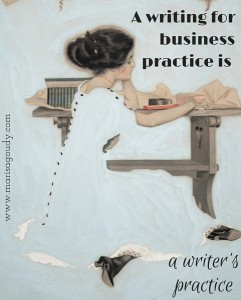 Gone are the days of the elitist “real writer.” There's no need to play the artist or the intellectual who separates herself from the hack and the profiteer.
Gone are the days of the elitist “real writer.” There's no need to play the artist or the intellectual who separates herself from the hack and the profiteer.
When you go to practice, you expect to see a coach there
I don't generally do sports metaphors when I talk about my writing coaching. (If you're the kid whose single basket during middle school YMCA basketball is still a point of pride for your poor dad, the coach, you'd avoid talking about sports too.)
And yet, as I talk about the importance of practice and the longterm commitments and implications of such a practice, it does feel like I'm asking you to get better at playing a game. And in order to really hone your skills, you want a guide and an ally to teach you new skills and refine your own natural abilities. You want a coach.
I would love to support you and help you discover a writing-for-business practice that you can sustain and that can sustain your business.
And if you’re someone who thrives on spreadsheets and long term visioning, I can even help you create and maintain an editorial calendar (just don’t ever ask to look at mine!).
Consider what the Sovereign Standard Writing Coaching Program can do for you.